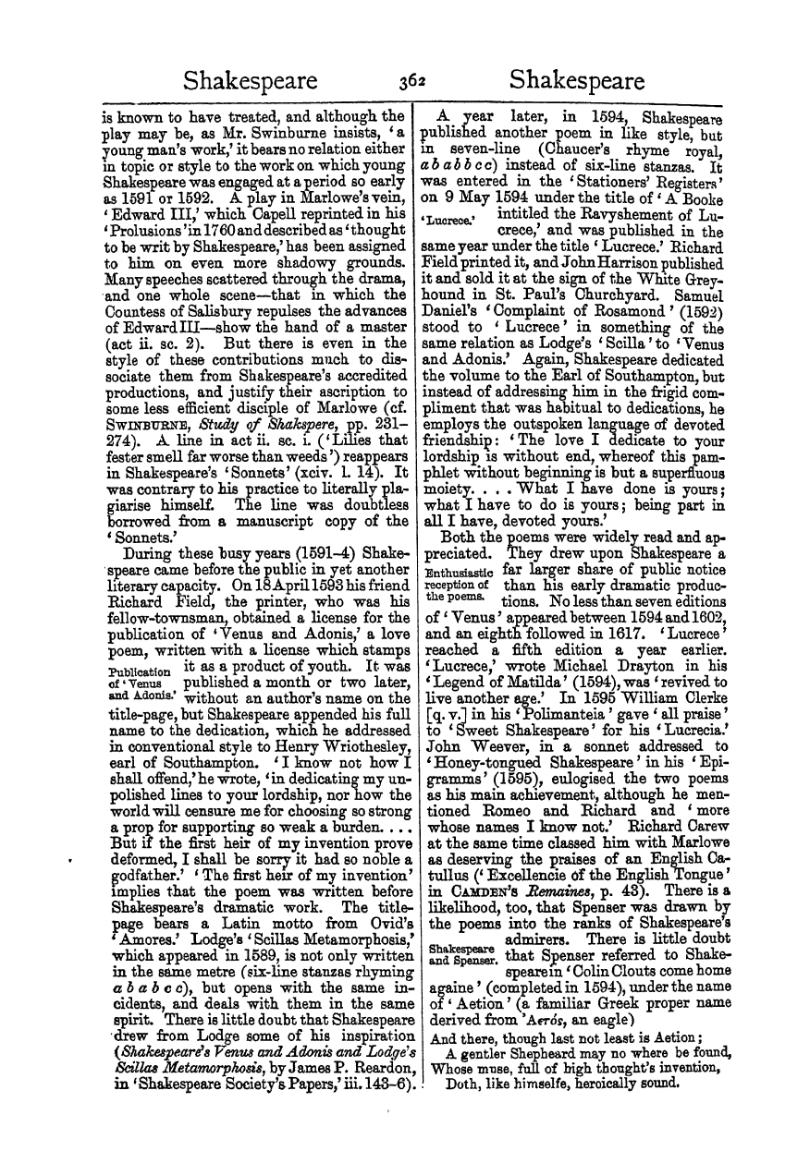is known to have treated, and although the play may be, as Mr. Swinburne insists, ‘a young man's work,’ it bears no relation either in topic or style to the work on which young Shakespeare was engaged at a period so early as 1591 or 1592. A play in Marlowe's vein, ‘Edward III,’ which Capell reprinted in his ‘Prolusions’ in 1760 and described as ‘thought to be writ by Shakespeare,’ has been assigned to him on even more shadowy grounds. Many speeches scattered through the drama, and one whole scene—that in which the Countess of Salisbury repulses the advances of Edward III—show the hand of a master (act ii. sc. 2). But there is even in the style of these contributions much to dissociate them from Shakespeare's accredited productions, and justify their ascription to some less efficient disciple of Marlowe (cf. Swinburne, Study of Shakspere, pp. 231–274). A line in act ii. sc. i. (‘Lilies that fester smell far worse than weeds’) reappears in Shakespeare's ‘Sonnets’ (xciv. l. 14). It was contrary to his practice to literally plagiarise himself. The line was doubtless borrowed from a manuscript copy of the ‘Sonnets.’
During these busy years (1591–4) Shakespeare came before the public in yet another literary capacity. On 18 April 1593 his friend Richard Field, the printer, who was his fellow-townsman, obtained a license for the publication of ‘Venus and Adonis,’ a love poem, written with a license which stamps it as a product of youth. It was published a month or two Publication of ‘Venus and Adonis.’later, without an author's name on the title-page, but Shakespeare appended his full name to the dedication, which he addressed in conventional style to Henry Wriothesley, earl of Southampton. ‘I know not how I shall offend,’ he wrote, ‘in dedicating my unpolished lines to your lordship, nor how the world will censure me for choosing so strong a prop for supporting so weak a burden. … But if the first heir of my invention prove deformed, I shall be sorry it had so noble a godfather.’ ‘The first heir of my invention’ implies that the poem was written before Shakespeare's dramatic work. The title-page bears a Latin motto from Ovid's ‘Amores.’ Lodge's ‘Scillas Metamorphosis,’ which appeared in 1589, is not only written in the same metre (six-line stanzas rhyming a b a b c c), but opens with the same incidents, and deals with them in the same spirit. There is little doubt that Shakespeare drew from Lodge some of his inspiration (Shakespeare's Venus and Adonis and Lodge's Scillas Metamorphosis, by James P. Reardon, in ‘Shakespeare Society's Papers,’ iii. 143–6).
A year later, in 1594, Shakespeare published another poem in like style, but in seven-line (Chaucer's rhyme royal, a b a b b c c) instead of six-line stanzas. It was entered in the ‘Stationers' Registers’ on 9 May 1594 under the title of ‘A Booke intitled the Ravyshement of Lucrece,’ and was published in the same year under the title ‘Lucrece.’‘Lucrece.’ Richard Field printed it, and John Harrison published it and sold it at the sign of the White Greyhound in St. Paul's Churchyard. Samuel Daniel's ‘Complaint of Rosamond’ (1592) stood to ‘Lucrece’ in something of the same relation as Lodge's ‘Scilla’ to ‘Venus and Adonis.’ Again, Shakespeare dedicated the volume to the Earl of Southampton, but instead of addressing him in the frigid compliment that was habitual to dedications, he employs the outspoken language of devoted friendship: ‘The love I dedicate to your lordship is without end, whereof this pamphlet without beginning is but a superfluous moiety. … What I have done is yours; what I have to do is yours; being part in all I have, devoted yours.’
Both the poems were widely read and appreciated. They drew upon Shakespeare a far larger share of public notice than his early dramatic productions. No less than Enthusiastic reception of the poems.seven editions of ‘Venus’ appeared between 1594 and 1602, and an eighth followed in 1617. ‘Lucrece’ reached a fifth edition a year earlier. ‘Lucrece,’ wrote Michael Drayton in his ‘Legend of Matilda’ (1594), was ‘revived to live another age.’ In 1595 William Clerke [q. v.] in his ‘Polimanteia’ gave ‘all praise’ to ‘Sweet Shakespeare’ for his ‘Lucrecia.’ John Weever, in a sonnet addressed to ‘Honey-tongued Shakespeare’ in his ‘Epigramms’ (1595), eulogised the two poems as his main achievement, although he mentioned Romeo and Richard and ‘more whose names I know not.’ Richard Carew at the same time classed him with Marlowe as deserving the praises of an English Catullus (‘Excellencie of the English Tongue’ in Camden's Remaines, p. 43). There is a likelihood, too, that Spenser was drawn by the poems into the ranks of Shakespeare's admirers. There is little doubt that Spenser referred to Shakespeare and Spenser.Shakespeare in ‘Colin Clouts come home againe’ (completed in 1594), under the name of ‘Aetion’ (a familiar Greek proper name derived from Aetos, an eagle)
And there, though last not least is Aetion;
A gentler Shepheard may no where be found,
Whose muse, full of high thought's invention,
Doth, like himselfe, heroically sound.
